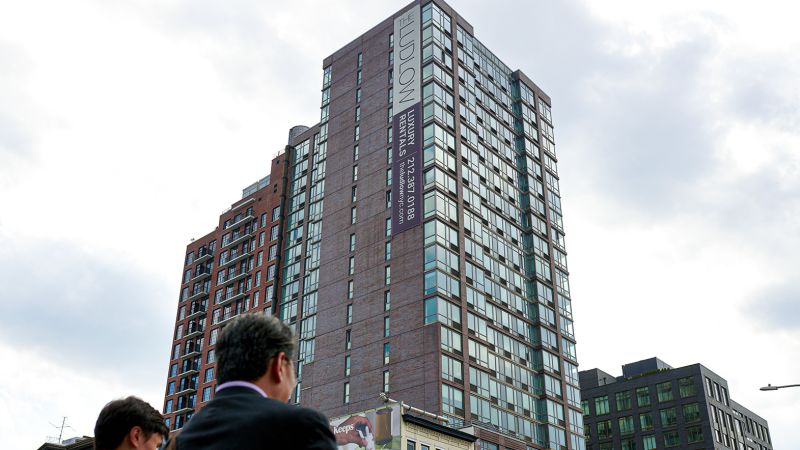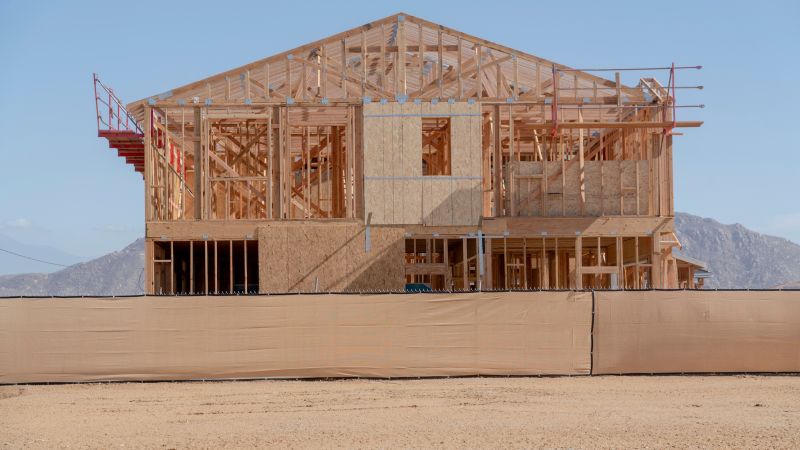
Washington, DC
CNN
—
Even as rents continue to climb across the country, renting is still cheaper than monthly payments for a purchased home in 45 of the 50 largest US cities in December, according to a report from Realtor.com. Renting costs nearly $800 less per month than buying, on average.
But there are five cities where, despite stubbornly high prices, rising mortgage rates and some of the least affordable home buying conditions in decades, it is still cheaper to buy than to rent.
Rent is still going up, but steadily slowed its pace of growth throughout 2022. The national median rent jumped 3.2% in December from a year ago, marking the eleventh month of slowing rent growth from January’s peak of 17.4% growth, according to the report, released on Thursday.
Following four months of declines, median asking rent flattened out in December at $1,712 per month. That’s down by $69 per month from the peak in July 2022, but is still $308 higher than December 2019. It also represents an increase of 21.9% from pre-pandemic levels.
A year ago, as rents were spiking but mortgage rates had not surged, it was more affordable to buy in many cities than to rent.
But with mortgage rates double where they were a year ago, monthly costs to own a home have created a widening gap between rents and payments made by first-time homebuyers. Homeownership costs grew 37.4% in December 2022 from the year before. That was more than 10 times faster than rents, which were up 3.2% during the same period.
During the first half of 2022, as mortgage rates surged, several cities flipped from being favorable to buyers to being more favorable to renters, including Atlanta; Baltimore; Charlotte, North Carolina; Cleveland; Hartford, Connecticut; Indianapolis; Philadelphia; Miami; and Orlando, Jacksonville and Tampa, Florida.
Baltimore is the only city that flipped back to being a place where it is more favorable to buy in December 2022.
Now, just five markets of the top 50 cities favor homeownership over renting in December.
Memphis, Tennessee, had the biggest savings to homebuyers over renters, with the monthly cost of homeownership 32.7% less than renting. It was followed by Pittsburgh; Birmingham, Alabama; St. Louis and Baltimore. Monthly buying costs assume a 7% down payment with a mortgage rate of 6.36%, and include taxes, insurance and homeowners association fees.
The amount saved by purchasing a home in these cities has decreased from last year, as stubbornly high prices and elevated mortgage rates eat away at the financial payoff to buying.
Deciding whether to rent or buy ultimately depends on personal circumstances, including location, financial situation and how long one plans to live in the home. Generally, it is not in your financial interest to buy if you plan to live in your home less than a few years, and a common rule of thumb is to not spend more than 30% of your income on housing costs.
Plus, buying a home is a lot easier said than done in many markets, as the inventory of homes to buy is historically low.
Austin, Texas, offered the biggest discount for renting compared to buying, with renting 121% or $2,013 cheaper per month. It was followed by San Francisco, where renting was 97% less and Seattle was 86% cheaper.
These rent-favoring metros are cities with a higher concentration of tech workers and high earners, where both the average rent-cost and buy-cost are higher than the national average, the report showed.
The advantage of renting is growing in Sun Belt cities, where rents continued to cool faster than other parts of the United States in December, according to Realtor.com.
Just because rents have surged in some cities, doesn’t mean that housing costs haven’t gone up even more. Even in Florida cities like Miami, Tampa and Orlando, which have seen some of the highest rent growth and rent costs in the past year, renting is still more affordable than buying a starter home.
Although renting will likely be cheaper than buying for most people in 2023, rental affordability remains a key issue as prices are expected to hit new highs, said Danielle Hale, Realtor.com’s chief economist.
“We expect rents will keep hitting new highs, driven by factors including still-low vacancy rates, lagging new construction and demand from would-be first-time buyers,” Hale said.
Note:- (Not all news on the site expresses the point of view of the site, but we transmit this news automatically and translate it through programmatic technology on the site and not from a human editor. The content is auto-generated from a syndicated feed.))



